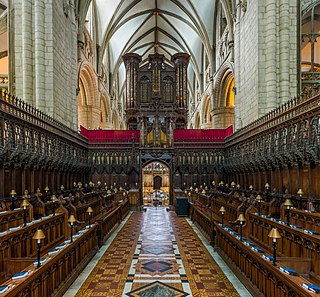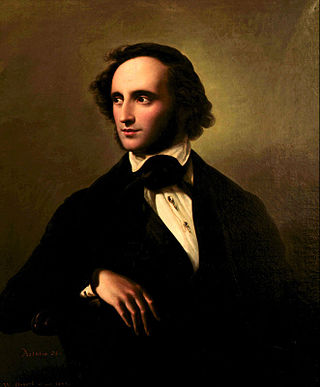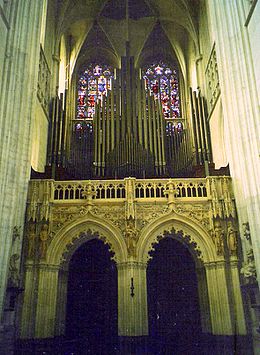
Chichester Psalms is an extended choral composition in three movements by Leonard Bernstein for boy treble or countertenor, choir and orchestra. The text was arranged by the composer from the Book of Psalms in the original Hebrew. Part 1 uses Psalms 100 and 108, Part 2 uses 2 and 23, and Part 3 uses 131 and 133. Bernstein scored the work for a reduced orchestra, but also made a version for an even smaller ensemble of organ, one harp, and percussion.

Jules Jozef Paul Maria Van Nuffel was a Belgian priest, composer, choirmaster, music pedagogue, musicologist and a renowned expert on religious music.

The Genevan Psalter, also known as the Huguenot Psalter, is a 1539 metrical psalter in French created under the supervision of John Calvin for liturgical use by the Reformed churches of the city of Geneva in the sixteenth century.

Cantique de Jean Racine, Op. 11, is a composition for mixed choir and piano or organ by Gabriel Fauré. The text, "Verbe égal au Très-Haut", is a French paraphrase by Jean Racine of a Latin hymn from the breviary for matins, Consors paterni luminis. The nineteen-year-old composer set the text in 1864–65 for a composition competition at the École Niedermeyer de Paris, and it won him the first prize. The work was first performed the following year on 4 August 1866 in a version with accompaniment of strings and organ. The style shows similarities with his later work, Requiem. Today, the two works are often performed together.

Psalm 137 is the 137th psalm of the Book of Psalms, beginning in English in the King James Version: "By the rivers of Babylon, there we sat down". The Book of Psalms is part of the third section of the Hebrew Bible, and a book of the Christian Old Testament. In the slightly different numbering system used in the Greek Septuagint and Latin Vulgate translations of the Bible, this psalm is Psalm 136. In Latin, it is known by the incipit, "Super flumina Babylonis". The psalm is a communal lament about remembering Zion, and yearning for Jerusalem while dwelling in exile during the Babylonian captivity.

Psalm 146 is the 146th psalm of the Book of Psalms, beginning in English in the King James Version, "Praise ye the LORD. Praise the LORD, O my soul". In Latin, it is known as "Lauda anima mea Dominum".

Psalm 126 is the 126th psalm of the Book of Psalms, beginning in English in the King James Version: "When the Lord turned again the captivity of Zion, we were like them that dream". In Latin, it is known as In convertendo Dominus. It is one of the fifteen Songs of Ascent in the Book of Psalms whose opening words in Hebrew are "Shir HaMaalot". In the slightly different numbering system used in the Greek Septuagint version of the Bible and in the Latin Vulgate, this psalm is Psalm 125.

Psalm 93 is the 93rd psalm of the Book of Psalms, beginning in English in the King James Version: "The LORD reigneth, he is clothed with majesty". The Latin wording is Dominus regnavit, decorem indutus est. The Book of Psalms is part of the Hebrew Bible and the Christian Old Testament. In the slightly different numbering system of the Greek Septuagint and Latin Vulgate versions of the Bible, this psalm is Psalm 92. It is the first of a series of psalms which are called royal psalms as they praise God as King.

Psalm 6 is the sixth psalm of the Book of Psalms, beginning in English in the King James Version: "O LORD, rebuke me not in thine anger, neither chasten me in thy hot displeasure". In Latin, it is known as "Domine ne in furore tuo arguas me". This penitential psalm is traditionally attributed to David.

Psalm 133 is the 133rd psalm of the Book of Psalms, beginning in English in the King James Version: "Behold, how good and how pleasant it is for brethren to dwell together in unity". In Latin, it is known as "Ecce quam bonum". The psalm is one of the fifteen Songs of Ascents, and one of the three Songs of Ascents consisting of only three verses.

Psalm 125 is the 125th psalm of the Book of Psalms, beginning in English in the King James Version: "They that trust in the LORD shall be as mount Zion". In Latin, it is known by as, "Qui confidunt in Domino". The Book of Psalms is part of the third section of the Hebrew Bible, and a book of the Christian Old Testament. Psalm 125 is one of fifteen psalms that begin with the words "A song of ascents".

Psalm 122 is the 122nd psalm of the Book of Psalms, beginning in English in the King James Version: "I was glad" and in Latin entitled Laetatus sum. It is attributed to King David and one of the fifteen psalms described as A song of ascents. Its title, I was glad, is reflected in a number of choral introits by various composers.

Psalm 48 is the 48th psalm of the Book of Psalms, beginning in English in the King James Version: "Great is the LORD, and greatly to be praised in the city of our God". In the slightly different numbering system used in the Greek Septuagint version of the bible, and generally in its Latin translations, this psalm is Psalm 47. In the Vulgate, it begins "Magnus Dominus". The psalm was composed by the sons of Korah, as "a celebration of the security of Zion", In its heading it is referred to as both a "song" and a "psalm".

Psalm 62 is the 62nd psalm of the Book of Psalms, beginning in English in the King James Version: "Truly my soul waiteth upon God: from him cometh my salvation". The Book of Psalms is part of the third section of the Hebrew Bible, and a book of the Christian Old Testament. In the slightly different numbering system used in the Greek Septuagint version of the Bible and in the Latin Vulgate, this psalm is Psalm 61. In Latin, it is known as "Nonne Deo subiecta erit anima mea". The psalm offers a warning not to let one's power erode one's trust in God.
In convertendo Dominus, Op. 32, is the musical setting of In convertendo Dominus, written by Jules Van Nuffel in 1926 for a mixed choir and organ.

In convertendo Dominus, sometimes referred to as In convertendo, is the Latin version of Psalm 126. It has been set in full for a cappella choir by, amongst others, George de La Hèle (1547-1586) and Jean-Noël Marchand (1666-1710), by Dmitri Bortnyansky (1777), Marc-Antoine Charpentier H.169 (1670 ?), Michel-Richard Delalande S.25 (1684), Charles-Hubert Gervais (1723) and Jean-Philippe Rameau (In convertendo Dominus, c. 1710), by 16th century Scottish priest Patrick Douglas, as a motet for choir and orchestra and by Jules Van Nuffel for mixed choir and organ as his Op. 32 (1926); it has also been set in part for a cappella choir by Giovanni Bernardino Nanino..

Laetatus sum, Op. 45, is a musical setting of Psalm 122 in Latin by Jules Van Nuffel, composed in 1935 for mixed choir and organ.
The Lord Is My Shepherd is a sacred choral composition by John Rutter, a setting of Psalm 23. The work was published by Oxford University Press in 1978. Marked "Slow but flowing", the music is in C major and 2/4 time. Rutter composed it for Mel Olson and the Chancel Choir of the First United Methodist Church in Omaha, Nebraska. He later included the work as a movement in his Requiem of 1985, then with orchestra or chamber ensemble. In 1993, Rutter also made it part of his Psalmfest, a collection of nine psalms written over 20 years. For that version, he used also soloists.

In Exile is a motet by Herbert Sumsion, who was for decades organist at Gloucester Cathedral. He set in 1981 a biblical text from Psalm 137 in English, beginning "By the waters of Babylon", scored for double choir a cappella. The motet was published by Basil Ramsey.

Jauchzet dem Herrn, alle Welt, WoO. 28, is an anthem for choir a cappella, a setting of Psalm 100 in German composed by Felix Mendelssohn in 1844. It was published in 1855 after the composer's death. It is the most popular setting of Psalm 100 by Mendelssohn, who also wrote a four-part motet in Latin, "Jubilate Deo", as part of Three Motets, Op. 69, in 1847 for use in the Church of England, which adds a doxology to the psalm text. He set the psalm again, but with paraphrased text by Ambrosius Lobwasser, "Ihr Völker auf der Erde all", as part of Sieben Psalmen, harmonising melodies from the Genevan Psalter.

















